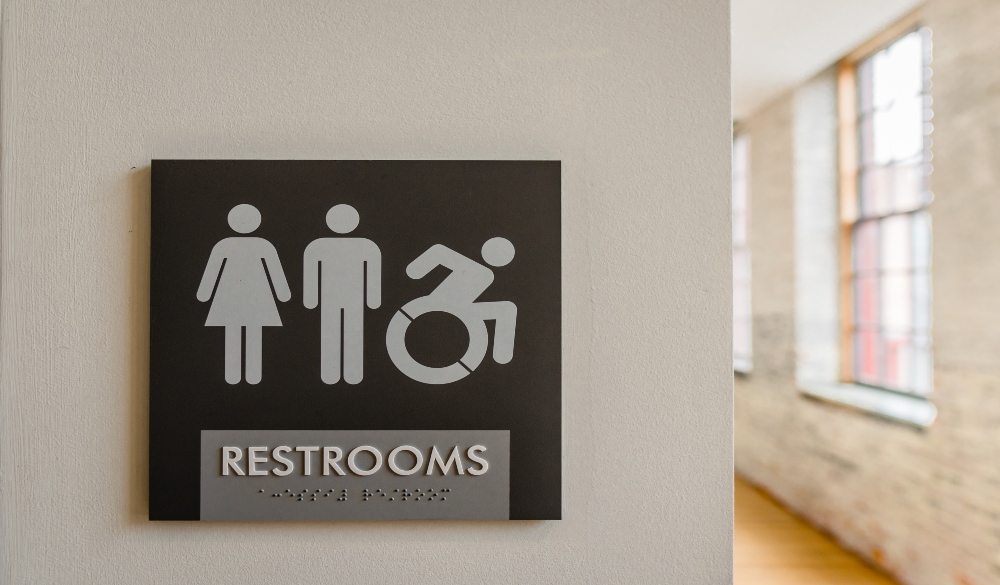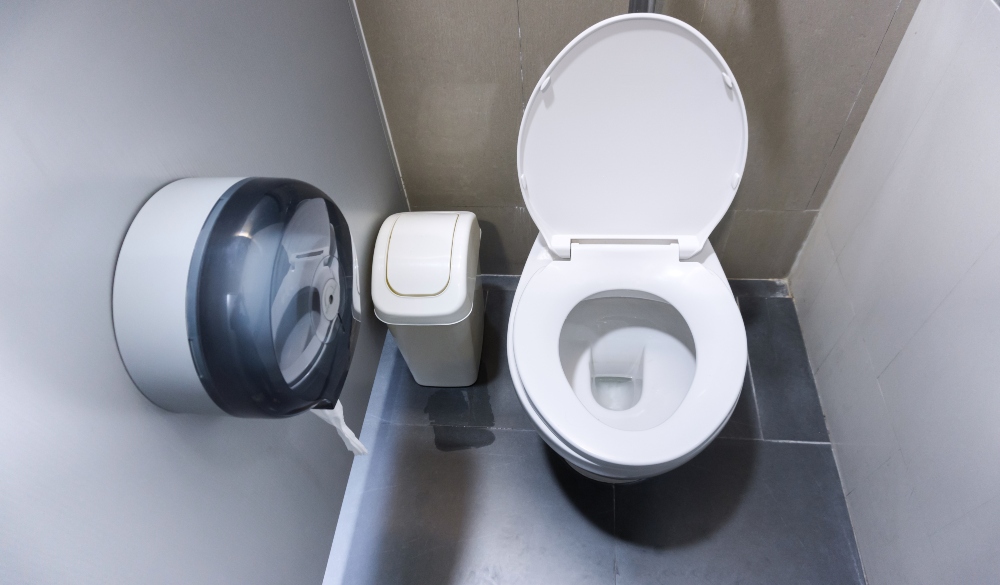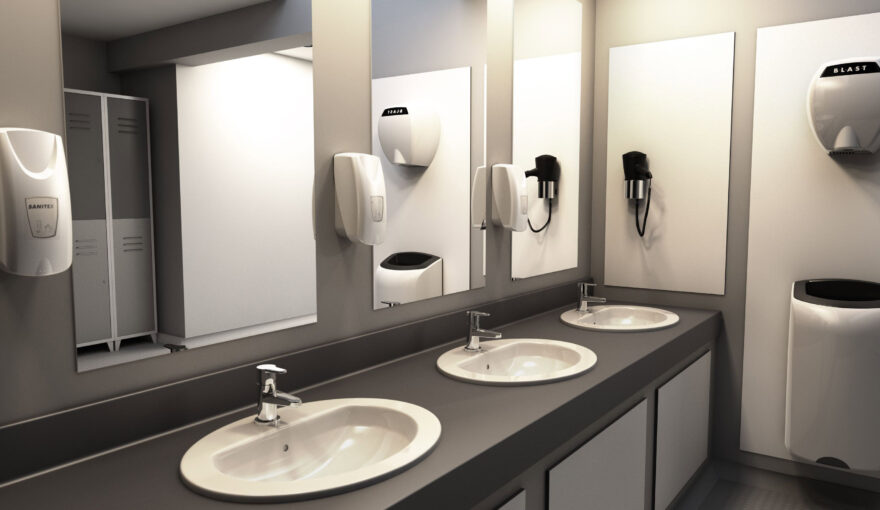When discussing commercial hygiene, one common question is often asked: is it a legal requirement to have sanitary bins?

In this blog post, we discuss this question to understand the significance of sanitary waste management, the associated laws and regulations in the UK, the dangers of neglecting proper disposal methods, and how to choose the right sanitary bin for your workplace.
What is sanitary waste?
Sanitary waste refers to any waste that comes from human hygiene, particularly from the use of toilets and bathrooms. This waste includes items such as sanitary pads, tampons, nappies and other personal hygiene products. Improper disposal of sanitary waste can lead to various hygiene and legal issues.
What are the dangers of sanitary waste?
Neglecting the proper disposal of sanitary waste can have serious consequences and can lead to the spread of infections and diseases. Bacteria and pathogens present in blood and other bodily fluids can thrive in unsanitary conditions, posing health risks to anyone who comes into contact with them.
Moreover, improper disposal methods, such as flushing sanitary products down the toilet, can cause blockages in plumbing systems leading to costly repairs. Additionally, overflowing or improperly disposed sanitary waste can create unpleasant odours and negatively impact the overall hygiene levels in the workplace.
Is it a legal requirement to have sanitary bins?
In the United Kingdom, sanitary waste management in the workplace is governed by various regulations, the primary being the Workplace (Health, Safety and Welfare) Regulations 1992. While these regulations do not explicitly mandate supplying sanitary bins, they emphasise the duty of employers to provide a safe and hygienic working environment for their employees.
Under Regulation 21 of the Workplace Regulations 1992, employers are required to provide suitable and sufficient sanitary convenience for employees, including toilets, washbasins with hot and cold running water, and adequate facilities for the disposal of sanitary waste. Failure to comply with these regulations can pose health risks to employees and can result in legal penalties for companies.
The Water Industry Act of 1991 also plays a crucial role in the UK in regulating the disposal of waste through flushing. This legislation aims to protect the water supply from contamination and damage caused by improper disposal. Under the act, it is prohibited to dispose of any material that may interfere with the proper functioning of sewage systems. This includes items such as sanitary products, wipes and other non-biodegradable materials that are often flushed down toilets. Violating this act can result in penalties as well as serious environmental harm.
Likewise, the Environmental Protection Act 1990 serves as another cornerstone of environmental legislation in the UK. This act prohibits the disposal of controlled waste in a manner that is likely to cause harm to human health or cause pollution to the environment. Controlled waste includes various types of waste including sanitary waste. By enforcing measures to promote responsible waste management the Environmental Protection Act plays a vital role in encouraging businesses to uphold environmental standards and legal obligations in regards to waste disposal. This act places a legal ‘Duty of Care’ upon you and your organisation, to ensure that all waste produced on your premises is correctly managed right up to the point of final disposal.
What is the process for disposing of sanitary waste?
Under the ‘Duty of Care’ principle the responsibility to ensure waste is handled and disposed of properly is placed on the business. By engaging with a reputable external hygiene company for sanitary waste management you can fulfil your duty of care obligations.
Outsourcing sanitary waste disposal allows you to ensure compliance with legal requirements while maintaining optimal hygiene standards in the workplace. At NWR Hygiene Group, we can provide all of the correct documents to certify that your waste is being disposed of correctly.

Choosing the right sanitary bin for your business
Selecting an appropriate sanitary bin is crucial for effective sanitary waste management. Here are some factors to consider when choosing a sanitary bin for your business:
1. Size and capacity
You should choose a bin size and capacity that aligns with the number of users and the frequency of waste disposal required. Our hygiene experts can offer knowledge and advice on products that will be best for your workplace.
2. Discreet design
We recommend choosing sanitary bins that are discreet and aesthetically pleasing, allowing them to blend seamlessly into washrooms and enhance the overall appearance of the space.
Within our product range, we have a slimline, hands-free, foot pedal sanitary bin available in white and chrome which is popular due to its hygienic discreet design. The SaniPod™ is equally popular due to its compact, unobtrusive design with the added benefit of being wall-mounted.
3. Odour control
Consider sanitary bins equipped with odour-control features such as scented liners, to maintain a pleasant and fresh washroom environment for all users.
4. Hygiene features
We recommend you choose a sanitary bin with hands-free operation mechanisms, such as foot pedals or sensor technology, to minimise the risk of surface contamination.
5. Compliance with regulations
Ensure that your sanitary bins of choice comply with relevant regulations and standards such as those set by the Health and Safety Executive (HSE) in the United Kingdom to support safety and optimal hygiene for employees.
Finding a sanitary bin provider
When seeking a reliable sanitary bin provider it is important to consider the best solution for your commercial environment. As a commercial hygiene company, we understand the importance of maintaining a clean and hygienic workplace environment and can offer tailored advice on the best state-of-the-art products to ensure safe and reliable solutions.
Our range of sanitary bins is designed to promote hygiene, convenience, and compliance with regulations. With hands-free operation, odour-control features and discreet designs, we help promote a clean and safe workplace environment.
So, is it a legal requirement to have sanitary bins?
While there is no specific legal requirement mandating sanitary bins in the workplace in the UK, employers are legally obligated to ensure suitable facilities for the disposal of sanitary waste as part of their duty to provide a safe and hygienic working environment. Neglecting proper sanitary waste management can pose health risks and legal consequences. By choosing the right sanitary bins and adhering to relevant regulations, employers can promote hygiene and safety in the workplace.
If you are looking for more information on our sanitary bin services, get in touch with our team.

